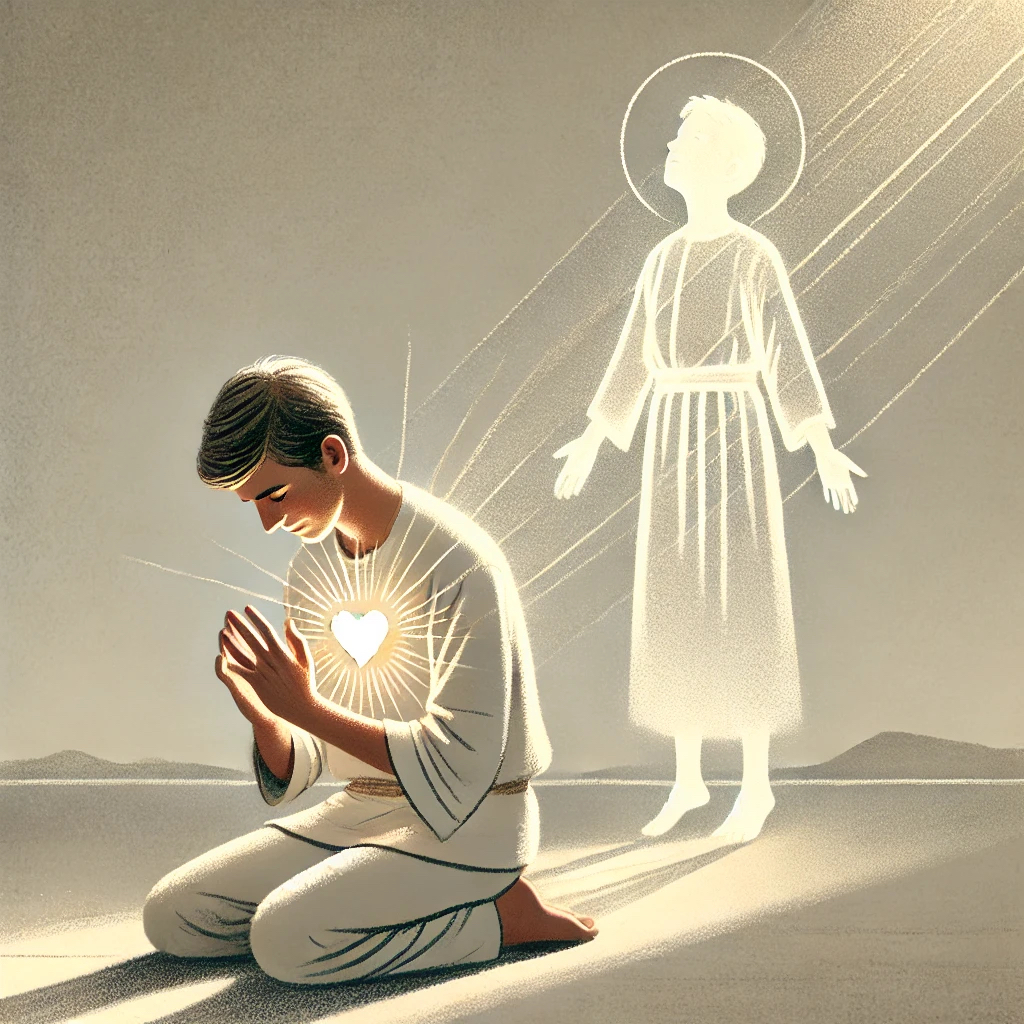在我们的日常生活中,外表的洁净往往是人们非常注重的一个方面。我们洗澡、穿干净的衣服,确保自己在别人面前显得整洁、得体。然而,“圣洁”这个词带来的联想远不止于此。圣洁不仅仅意味着外表的洁净,它还指向一种更深层次的灵魂洁净、这种洁净是人类用任何外在手段都无法达到的。
很显然,标题这句话升华了一个概念,“圣洁”用于洗澡是否干净时有点太高雅了,同时也否定了通过清洗身体的方式实现的可能性,即无论洗多少次都无法洁净内心及灵魂深处的污垢、忧愁、烦恼和欲望。还有一种仪式叫‘洗礼’,人们通过参加施洗礼接受耶稣基督做自己的救主并成为祂的门徒。要警惕的是,无论是哪种形式,当人们关注自己躯体远远超过了对自己内心是否洁净时就与圣洁无分了。
- “圣洁”是耶稣基督赐给祂的门徒与祂交通的钥匙,是门徒在世上快乐生活的捷径;
- “圣洁”是内心有了耶稣居住其中带领自己面对一切的信心;
- “圣洁”暗示着对耶稣的信靠异常坚固,无论身处在什么境况都会快乐度过。
换言之,这样的“圣洁”是内心深处对世界的看法回归到最纯真的状态,像小孩子一样简单、纯净,心中充满对天父带领的渴望,是圣灵充满的成果。今天我们就来讨论一下:

内心的圣洁:回归孩子般的单纯
耶稣曾说:“我实在告诉你们,若不回转,变成小孩子的样式,断不得进天国。”(马太福音18:3)这句话提醒我们,内心的纯洁和对神的依赖,是进入天国的重要条件。小孩子的心是纯真的,他们没有复杂的动机和计算,他们对世界充满好奇和信任,更重要的是,他们对父母的依赖和信任是全然的,毫无保留。
然而,随着年龄的增长,我们的心思意念逐渐被世俗的经历所复杂化,甚至被罪恶所污染。这使得我们在面对神的召唤时,会有许多的犹豫和怀疑。世界上的各种邪恶力量,总是试图引诱我们偏离神的道路,去追逐那些看似吸引人的事物——财富、权力、声望、享乐……这些东西虽然在世人眼中看似重要,但却常常让我们远离神,迷失在欲望的泥沼中。一个愿意成为“圣洁”的人,不是完全不接触这个世界,而是能够在与世界的接触中,始终保持对神的专注。当世界的邪恶声音试图扰乱我们时,我们需要立刻将目光投向天父,寻求祂的保护和引导,像小孩子转身寻找父母一般。
对于我们这些成年信徒来说,回归这种孩子般的单纯并不容易。随着年龄的增长,我们经历了许多世俗的影响,内心也逐渐变得复杂,我们学会了防备他人,开始追求个人利益,甚至在面对神的召唤时,也同样有许多的犹豫和怀疑,这些阻碍我们顺从神召唤的往往是我们所谓的阅历和经验。我们慢慢变成了年轻人眼中的‘老顽固’,不仅是年龄变老,更重要的是心思意念僵化,不愿意为新的思想改变。
记得那个想‘偷偷’学艺的尼哥底母提出的问题吗:“人已经老了,如何能重生呢?岂能再进母腹生出来吗?”(约翰福音 3:4 和合本),他的问题揭示了我们心中那种对改变的恐惧,一个人幻想拥有自由快乐的人生却不愿意采取脱胎换骨的改变又怎么可能实现呢?
悔改:内心仰望与交托
这种改变就是让我们‘回转向神’。悔改并不仅仅意味着在生活中的表现行为上处处符合摩西律法,而是意味着我们内心的思维方式、我们的心思意念都在神面前转变。这样的悔改是内心深处的仰望与交托,就像站队一样,我们首先要选择站在神这一边,聆听来自你内心深处的声音;其次才是由这种将神放在首位的敬畏生发出爱人的行为。
当我们仰望神,将我们的心思意念完全交托给祂时,我们的行为自然会变得更加符合神的律法,但这并不是因为我们刻意遵守规则,而是因为我们从内心深处愿意取悦神,愿意活出祂的旨意。
圣经告诉我们:“敬畏耶和华是智慧的开端,认识至圣者便是聪明。”(箴言9:10)当我们选择敬畏神,我们就已经开启了通向智慧和圣洁道路的生活。敬畏神不是恐惧,而是深深的尊崇和爱慕,是一种深知神的圣洁和伟大,并愿意在祂面前谦卑自己,寻求祂的引导和保护,这样的人也是一个自由的人。

牢记“受洗”后的身份
亲爱的弟兄姐妹,如果你受洗过,你就会联想到另一个场景,当你在施洗者的带领下步入水中后,屏息、仰身入水,任由水慢慢包围、浸泡你整个身体的时候,你会意识到那种即将失去生命的“窒息感”,静默哪怕是几秒钟的时间再从水中出来后,你首先做的是快速拂去口鼻处的水,然后大口的呼吸让你获得重生的空气。
是的,这是受洗的过程,是肉体经历受洗的过程,受洗更重要的意义在于灵魂受洗的过程,在你的灵魂随着身体被水“埋葬”时,你在这个世界上所学会的一切生存技巧或人生经验也该同时被“埋葬”,一同被处死的还有自己生而为人、掌管自己生命的主权,如同一台电脑被清空了所有、恢复到出厂状态并被安装了来自于神的新的操作系统,这个过程非常快,也应当非常的决绝,这种决心甚至远超过你做‘决志祷告’的那一刻,因为受洗的仪式就是一个人‘置之死地而后生’的缩略版。
从你出水吸入的那一口空气开始,这个新造的人便以一个孩子般的心重新来到了这个世界,你不再以你的喜好厌恶标准去看待周围的人,因为你的判断标准全部被神的话语更新了,这便是耶稣基督喜悦的那个小孩子的样式。
虽然你仍然会受到来自于撒但的搅扰,是的,撒但怎么甘心那么轻易地从一个人心里被赶出去呢?它们会联合更多来自于其他人心中的那些撒但来攻击你、诱惑你,直到再次进入你的内心,再次取代神赐予的“操作系统”,如同病毒入侵,死亡的毒瘤不断伺机占领你本已开始“圣洁”的身体,直到再次被神的话语战胜......。
这是一个反反复复的争斗过程,是一个受洗后的新人每天要做的功课。也不是说一个人受洗多年以后就是旧人了,不,你永远是一个新人,而且要牢记:你是一个重生的新人,是圣洁的,因为有神赐予的CPU(Central Processing Unit,中央处理器),除非你再次“迎接”撒但这些病毒进入你内心。
这样,你便知道每天你都是干干净净的~~~~~靠主的话语洁净自己,抵挡撒但的攻击,成就出分别为圣的门徒生活。

结语
弟兄姐妹们,让我们重新审视我们的内心,不再只注重外表的洁净,而是寻求内心的真正圣洁。悔改不仅仅是行为上的调整,更是内心的仰望与交托。让我们像孩子一样,单纯地依赖天父,期待祂的召唤,愿意在祂的光中悔改、洁净自己。当我们面对世界的诱惑时,愿我们能立刻转向神,寻求祂的引导和保护。愿我们的生活,因着对神的专注和依赖,成为祂荣耀的见证,活出真正圣洁的生命。
让我们一起为此祷告!
(如有建议敬请留言讨论,邮箱:[email protected])
有一个建议:我们洗完澡后可否立即做一个祷告呢?如题所述
How Can One “Cleanse” to Become Holy?
In our daily lives, we often place great emphasis on external cleanliness. We bathe, wear clean clothes, and make sure we appear neat and proper in front of others. However, the word “holy” (or “sanctified”) conjures up far more than just outward purity. Holiness does not merely mean physical cleanliness; it points to a deeper purity of the soul—a cleansing that no external method can achieve.
Clearly, the title elevates the concept: using the idea of washing to determine whether one is “holy” is somewhat too refined. It also denies the possibility of achieving true sanctification solely by washing the body. No matter how many times one cleanses oneself physically, the dirt, sorrow, anxiety, and desires deep within the heart and soul cannot be washed away. There is also a ritual called baptism in which people publicly receive Jesus Christ as their Savior and become His disciples. The caution is this: regardless of the form—if a person’s focus is on the body far more than on whether their inner self is purified—they are separated from true holiness.
- “Holiness” is the key that Jesus Christ has given His disciples for fellowship with Him and is the shortcut to a joyful life in the world.
- “Holiness” means that the heart is filled with the indwelling of Jesus, which empowers one to face every circumstance with faith.
- “Holiness” implies an unshakable trust in Jesus so that, no matter the circumstance, one can live joyfully.
In other words, this kind of “holiness” arises from a return to a pure, childlike perspective on the world—a simplicity and innocence that is free from the complications of accumulated worldly concerns, and a heart filled with a longing for the guidance of our Heavenly Father. It is the result of a life filled with the Spirit. Today, let us discuss the following:

Inner Holiness: A Return to Childlike Simplicity
Jesus said,
“Truly I tell you, unless you change and become like little children, you will never enter the kingdom of heaven.” (Matthew 18:3)
This reminds us that the purity of our inner heart and our complete dependence on God are essential conditions for entering the Kingdom of Heaven. A little child’s heart is pure—they have no complex motives or calculations; they view the world with curiosity and complete trust. More importantly, their dependence on and trust in their parents is absolute and unreserved.
However, as we grow older, our thoughts become complicated by worldly experiences—and are even tainted by sin. This complexity causes us to hesitate and doubt when we respond to God’s call. Various evil forces in the world continually try to lead us away from God’s path, enticing us to chase after wealth, power, reputation, and pleasures. Though these things may seem important to the world, they often lead us away from God and mire us in the quicksand of desire. One who desires to be “holy” is not one who completely shuns the world; rather, such a person can interact with it while keeping their focus solely on God. When the evil voices of the world attempt to disturb our inner peace, we must immediately turn our gaze to our Heavenly Father, seeking His protection and guidance—much like a child who turns to find their parent.
For us adult believers, returning to that childlike simplicity is not easy. Over time we accumulate worldly experiences that make us guarded and self-interested; we even hesitate and doubt when God calls, with our past experiences and hard-won “wisdom” sometimes making us appear to the young as stubborn “old fogies.”
I recall Nicodemus once asking in secret, “How can someone be born again when they are old? Can they enter their mother’s womb a second time?” (John 3:4). His question reveals the fear of change within our hearts. How can one expect to enjoy a life of freedom and joy if one is unwilling to undergo a radical transformation?
Repentance: Lifting Our Gaze and Surrendering Our Hearts
This transformation begins when we “turn back to God.” Repentance does not simply mean that our behavior conforms to the Mosaic Law in every outward detail. Rather, it means that our inner way of thinking—our attitudes, our very thoughts—is transformed before God. Such repentance is an inward turning, a complete surrender in which we choose, like taking a side in a conflict, to stand with God and heed the inner promptings of our hearts. It is from this position of putting God first that loving actions naturally follow.
When we lift our eyes to God and surrender our hearts entirely to Him, our actions begin to align with His law—not because we force ourselves to obey rules, but because we sincerely desire to please God and live according to His will.
Remembering Our Baptismal Identity
Dear brothers and sisters, if you have been baptized, you may recall the moment when, guided by the one who administers the baptism, you stepped into the water and held your breath as you went under, allowing the water to envelop your entire body. That brief moment of “suffocation” in the water precedes your emergence, when you immediately shake off the water from your face and gasp for the fresh, life-giving air of rebirth.
Yes, that is the process of baptism—an experience of the body being submerged. Yet more importantly, baptism signifies the washing of the soul. It is as if, as your body is “buried” in water, all the survival skills and life experiences you have learned in the world are also meant to be buried. Along with them must die your claim over life itself—a kind of resetting, as though your computer were cleared and restored to factory settings before being loaded with a new operating system from God. This process is swift and resolute—a decision even more determined than that moment of “dedication prayer”—because the sacrament of baptism is like a condensed version of dying and being reborn.
From that moment when you draw in your first breath of fresh air, you become a new creation with a childlike heart. You no longer judge people by your own preferences or standards, for your judgment has been renewed by God’s Word. This is the childlike state that pleases Jesus.
Of course, you will still face disturbances from Satan. After all, how could Satan ever be easily expelled from a person’s heart? He may join forces with other “demons” dwelling in people’s hearts to attack and tempt you until he reoccupies that inner space, replacing God’s “operating system” much like a virus invading—a deadly tumor that will constantly seek to capture your newly “sanctified” self, until once again defeated by God’s Word.
This is the recurring struggle—a daily task for every person born again. And it is not to say that someone who was baptized long ago is forever free from these struggles; no, you are always a new creation. Always remember: you are a reborn, holy person endowed with God’s “CPU” (Central Processing Unit). Unless you continually “welcome” and expel those viral temptations, your inner self is at risk.
Thus, every day you have an opportunity to be renewed—cleansed by the Lord’s Word, resilient against Satan’s attacks—and live a life set apart for Him.

Conclusion
Dear brothers and sisters, let us reexamine our hearts. Let us not only focus on our external cleanliness, but also seek genuine inner holiness. Repentance is not merely an adjustment of our actions—it is an inward turning, a complete surrender. Let us, like little children, depend solely on our Heavenly Father, heed His call, and be willing to repent and cleanse ourselves in His light. When we face the temptations of the world, may we immediately turn to God, seeking His guidance and protection. May our lives, marked by our unwavering focus on God, serve as a testimony to His glory—living out truly holy lives.
Let us pray together for this!

发表回复